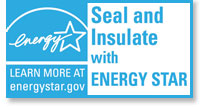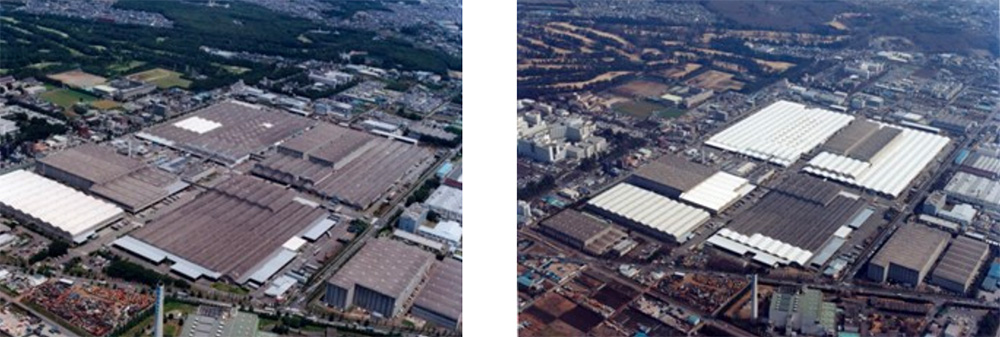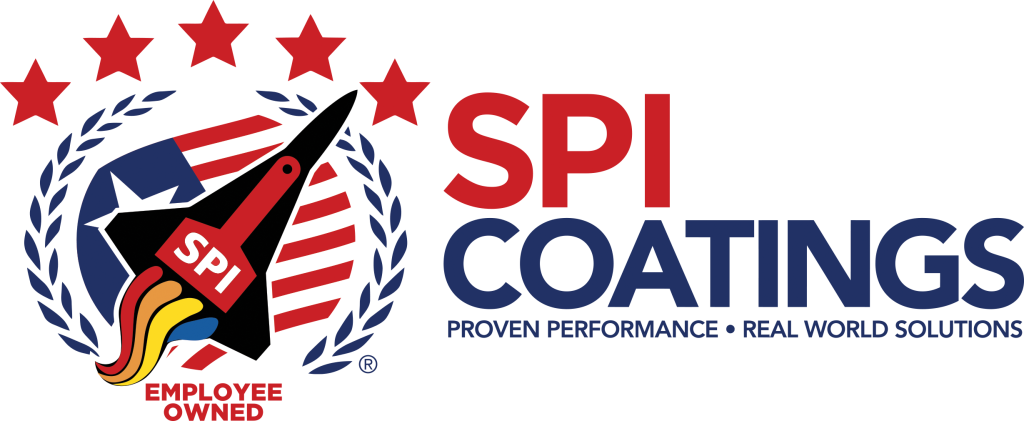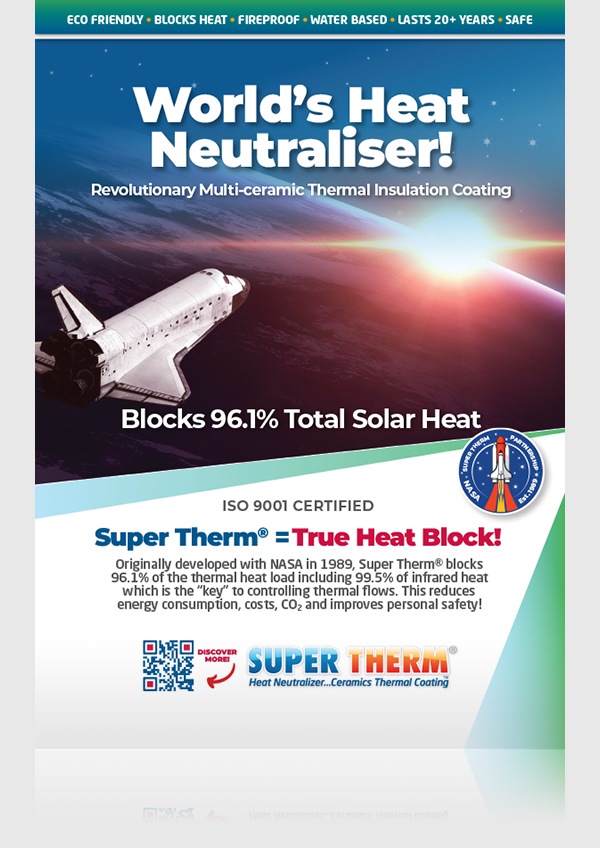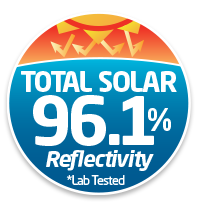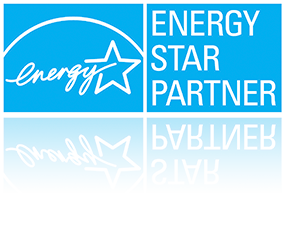Super Therm® & Heat Reflective Paints
White paint only reflects two elements of heat (UV and Visual Light) and does not reflect infra red heat – 53% of total heat energy…Super Therm® does!
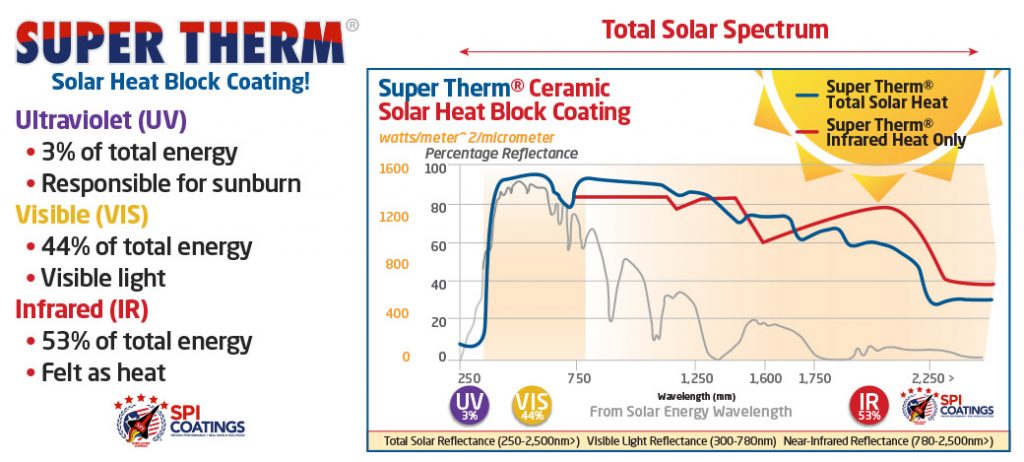
How Does Solar Heat Really Work?
Different Heat Reduction Coating Compounds Compared
Heat as presented is more than solar reflectivity and emissivity; it is also about the heat load. This is the missing part of the formula for true heat management. Find out more >
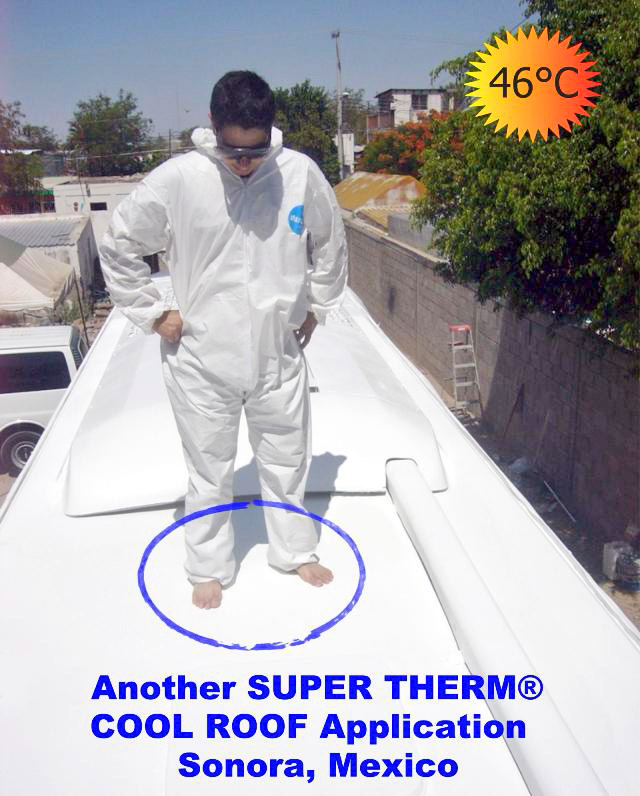
- White paint only reflects while it is clean, new, white and shiny.
- During summer in the middle of the day with the sun shining brightly, a white car roof will be too hot to touch because of emissivity. Therefore, it is absorbing (not reflecting) heat, and the absorbed heat will transfer to the interior of the car…the same is with any roof or other surface.
- The same roof painted with Super Therm® will be cool to the touch and no hotter than the ambient air temperature as it blocks most of the solar heat and does not load heat.
- When the exterior of a building is coated with Super Therm®, the result is similar to permanently placing the building or vehicle under a dense shade tree – the heat on the building or vehicle is substantially reduced. Reflective coatings cannot achieve this!
Explanation of emissivity and heat load
Japanese Institute of Standards
A test piece was taken from a roof in January 2006 where Super Therm® was applied in 1989, and tested at Building Material Test Center in Japan.
The climate is very severe in this area of Kansas with 38°c (100°F) in the summer, sand storms, very strong sun radiation, and -21°c (-5° F) in the winter with snow and ice. The reflectance of near infrared is 67.1%, but this is because the Super Therm® at that time did not contain the fourth ceramic, which was introduced in the year 2000 and designed to block infra red rays. Therefore, the result with the current Super Therm® is better.
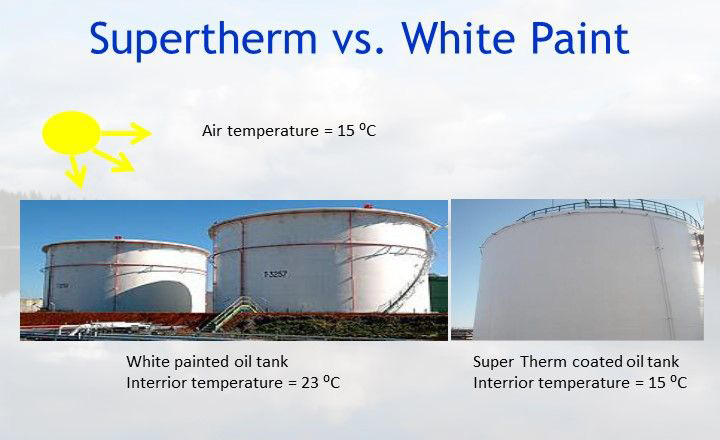
Reflective Paints Exposure Testing in Japan
When high reflective paint is applied, the ageing of performance should be considered. A study by Yasushi Kondo for the Tokyo Metropolitan Government, Japan Testing Center for Construction Materials on 21 heat reflective paints showed even the most reflective paint lost it’s solar reflectance by 44% within 1.5 years. It was noted, however there is no authorised standard for performance of high reflective paints in Japan. A standard or qualification system should be considered in Japan. Reflectivity was reduced for other reflective paints was 58% average. This is an accurate view of most reflective paints in the world market (Kondo, 2006).
Super Therm’s loss of solar reflectance in 3 years tested for the Energy Star Program was only 1%.
Extensive Testing
No other heat block type material has been field tested as extensively as Super Therm®. It has been rigorously field tested and meets the highest standards. The unique formula is UL, FM, ABS, IMO and Coast Guard approved and a VOC Compliant (just 67 grams/litre) water-based coating. Super Therm® has a Class ‘A’ Fire Rating against flame and smoke. Plus, it is USDA approved for use in and around food preparation areas.
Cool Roofs and Heat Reflective Paints
Dr John Pockett from the Barbara Hardy Institute from the University of South Australia gave a presentation. Here’s some excerpts from his research and findings:
- Exposed metals (Zincalume & galvanised) are poor at giving off heat (low Emissivity) so they become hotter than most other materials having the same TSR. This is between 12 and 20 degrees Celsius hotter than materials having the same TSR. As Zincalume ages, the TSR decreases but there is an increase in emissivity due to the oxide layer on the surface so the excess temperature over normal materials becomes less.
- The TSR is the reflectance of a surface weighted for the relative intensities in incoming sunlight. You can’t achieve good TSRs if you have a low reflectance in the visible (dark colour) no matter how good your IR reflectance is. The critical part of the spectrum is the region between 700 and 1100 nm where intensity is relatively high. If you can efficiently reflect IR in that range there is less absorbance causing the surface to heat up. With appropriate scatterers by whatever means there can be a substantial lowering of absorbance and surface temperature. The eye’s sensitivity in the 600 – 700 nm region is already falling off so it is possible to cheat a little with the visible colour match and already be boosting reflectance slightly lower than the nominal 700 nm cutoff.
- The benefits of heat reflective paint in lowering surface temperature are relatively small for the cooler light coloured paints. The larger benefits for darker colours just mean they go from being abysmal to just being very bad in surface temperature. The main benefits of the heat reflective paints is that they are usually formulated so that the surface is harder and/or slipperier. Different manufacturers will differ markedly in their ability to formulate their heat reflective paints to shed dirt, moulds etc.
Super Therm® compared with Thermoshield ALL4RVS blog
A blog ALL4RVS posted a comparison article of Thermoshield vs Super Therm®. Makes for interesting reading if you’re in the market to block the solar heat on your RV, Caravan or bus.
The Verdict
Based on these analyses, we can see that primarily their performances in heat reduction are neck in neck. But if we look at their other properties and benefits, I can say that Super Therm® is better in the account of the following:
- Less volume of coating required and less weight added on the RV
- Ability to reduce noise too
- Extensive case studies and strong partnerships with reliable organisations
- Well-trusted not only in its origin country but also to other countries worldwide – one of which is Australia of course
Comparison of Super Therm® to other reflecting coatings on the market
When tested for Energy Star Program
In the government testing procedures on the products by Insulating Coatings Corporation, Temp-Coat Brand Products, LLC, and SPM Thermoshield, Inc. dba Roof Guardian when tested for Energy Star Program, the testing was performed to demonstrate the reflectivity of a new roof and of a three-year old roof to determine the reduction in reflectivity/performance and loss of insulation effectiveness.
See the original report of the Energy Star Program at www.energystar.gov.
This comparison testing shows very clearly that Super Therm® is the best coating on the market to maintain its insulation ability over the years. The other coatings must be reapplied to maintain any insulation ability. Super Therm® does not have to reapplied.
Full report pdf
| Product | New Roof Reflectivity | 3 Year Old Roof | Percentage Reduction in Reflectivity |
| Aztec 900 | 86% | 77% | 10.5% |
| Warranty of 10 years would mean that at the end of 10 years the reflectivity would be reduced by a minimum of 30% | |||
| Temp Coat | 87.7% | 61% | 30% |
| Warranty of 10 years would mean that at the end of 10 years the reflectivity would be reduced by a minimum of 90% | |||
| Thermo-Shield | 84% | 63% | 25% |
| Warranty of 10 years would mean that at the end of 10 years the reflectivity would be reduced by a minimum of 75% | |||
| Super Therm® | 80% | 79% | 1% |
| Warranty of 10 years would mean that at the end of 10 years the reflectivity would be reduced by less than 0.04% | |||
Competitors using Super Therm images
They say imitation is the sincerest form of flattery so we were surprised when a Super Therm® competitor decided to use our images in their cool roof presentation!
In a presentation to the Alternative Technology Association, Melbourne Branch on Cool Roof Coatings, Perry Eckert from Nutech Paint Pty Ltd utilised two Super Therm® projects promoting Cool Roofs. An image on page 19 is of a Super Therm project from Chile and on page 70 a project from Nissan, Japan that’s been mislabelled ‘Very large factory roofs in California US’. See our Nissan project here.
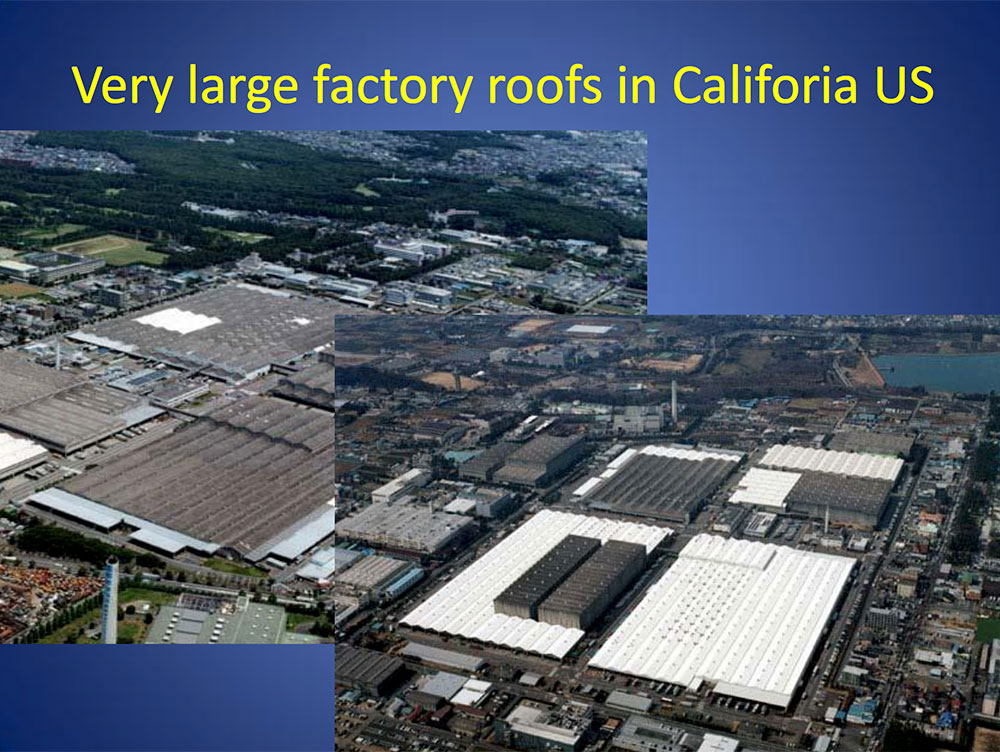
Clearly Super Therm‘s been around since 1989 and its nice our competitors wish to promote our successful projects…perhaps they should credit the images to Superior Products International II, Inc. and Super Therm®. Goes to show even our competitors love Super Therm® they’re happy to show off in the presentations. https://renew.org.au/wp-content/uploads/2018/12/cool-roofs.pdf



